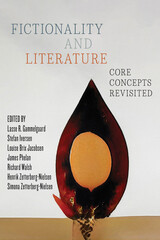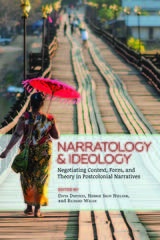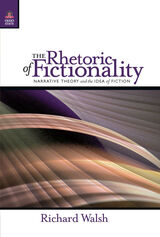3 books about Walsh, Richard

Fictionality and Literature
Core Concepts Revisited
Lasse R. Gammelgaard
The Ohio State University Press, 2022
Taking its cues from Richard Walsh’s influential 2007 book, The Rhetoric of Fictionality, Fictionality and Literature sets out to examine the implications of a rhetorical understanding of fictionality. A rhetorical approach understands fictionality and nonfictionality not as binary opposites but as different means to the same end: influencing an audience’s understanding of the world. Arguing that fiction is not just a feature of particular works, such as novels, but an adaptable instrument used to achieve an author’s specific rhetorical goals, the contributors theorize how to reconceive of core literary features and influences such as author, narrator, plot, character, consciousness, metaphor, metafiction/metalepsis, intertextuality, paratext, ethics, and social justice. Combining analyses of a wide range of texts by Colson Whitehead, Charles Dickens, Kazuo Ishiguro, Toni Morrison, Geoffrey Chaucer, and others with historical events such as the Nat Tate biography hoax and the Anders Breivik murders, contributors discuss not only a rhetorical definition of fictionality but also the wider consequences of such a conception. In addition, some chapters within Fictionality and Literature offer alternatives to a rhetorical paradigm, thus expanding the volume’s representation of the current state of the conversation about fictionality in literature.
Contributors:
H. Porter Abbott, Catherine Gallagher, Lasse R. Gammelgaard, Stefan Iversen, Louise Brix Jacobsen, Rikke Andersen Kraglund, Susan S. Lanser, Jakob Lothe, Maria Mäkelä, Greta Olson, Sylvie Patron, James Phelan, Richard Walsh, Wendy Veronica Xin, Henrik Zetterberg-Nielsen, Simona Zetterberg-Nielsen
Contributors:
H. Porter Abbott, Catherine Gallagher, Lasse R. Gammelgaard, Stefan Iversen, Louise Brix Jacobsen, Rikke Andersen Kraglund, Susan S. Lanser, Jakob Lothe, Maria Mäkelä, Greta Olson, Sylvie Patron, James Phelan, Richard Walsh, Wendy Veronica Xin, Henrik Zetterberg-Nielsen, Simona Zetterberg-Nielsen
[more]

Narratology and Ideology
Negotiating Context, Form, and Theory in Postcolonial Narratives
Divya Dwivedi, Henrik Skov Nielsen, Richard Walsh
The Ohio State University Press, 2018
Narratology and Ideology: Negotiating Context, Form, and Theory in Postcolonial Narratives, edited by Divya Dwivedi, Henrik Skov Nielsen, and Richard Walsh, brings together many of the most prominent figures in the interface between narratology and postcolonial criticism. While narrative theory has for some time recognized the importance of context in the analysis of fiction, this recognition has not quickly translated into substantial work in fields like postcolonialism, where situated questions of value and ideology have been brought to the fore. Postcolonial criticism, on the other hand, has often neglected the formal qualities of fiction in preference for ideological thematic interpretations, precisely because of the suspect legacy of formalism. The volume, then, stages a meeting between these two fields, negotiating both narratological and postcolonialist concerns by addressing specific features of narrative form and technique in the ideological analysis of key postcolonial texts.
The thirteen essays in Narratology and Ideology offer compelling readings of individual novels, with a focus upon South Asian literature, that provide a cumulative case study on the value of postcolonial narratology. The essays show not only how narrative theory can be productively applied in service of postcolonial criticism but also how such attention to postcolonial fictions can challenge and refine our theoretical understanding of narrative.
The thirteen essays in Narratology and Ideology offer compelling readings of individual novels, with a focus upon South Asian literature, that provide a cumulative case study on the value of postcolonial narratology. The essays show not only how narrative theory can be productively applied in service of postcolonial criticism but also how such attention to postcolonial fictions can challenge and refine our theoretical understanding of narrative.
[more]

The Rhetoric of Fictionality
Narrative Theory and the Idea of Fiction
Richard Walsh
The Ohio State University Press, 2007
Narrative theory has always been centrally concerned with fiction, yet it has tended to treat fictions as if they were merely the framed or disowned equivalents of nonfictional narratives. A rhetorical perspective upon fictionality, however, sees it as a direct way of meaning and a distinct kind of communicative gesture. The Rhetoric of Fictionality: Narrative Theory and the Idea of Fiction by Richard Walsh argues the merit of such a perspective and demonstrates its radical implications for narrative theory.
A new conception of fictionality as a distinctive rhetorical resource, somewhat like the master-trope of fictional narrative, cuts across many of the core theoretical issues in the field. The model, set out in chapter one, is subsequently tested and elaborated in relation to currently prevalent assumptions about narrativity and mimesis; narrative structure; the narrator and transmission; voice and mediacy; narrative media and cognition; and creativity, reception, and involvement. Throughout, the theoretical analysis seeks to vindicate readers’ intuitions about fiction without merely restating them: the result is a forceful challenge to many of narrative theory’s orthodoxies.
The rhetorical model of fictionality advanced in this book offers up new areas of inquiry into the purchase of fictiveness itself upon questions of narrative interpretation. It urges a fundamental reconception of the apparatus of narrative theory by theorizing the conditions of significance that make fictions conceivable and worthwhile.
[more]
READERS
Browse our collection.
PUBLISHERS
See BiblioVault's publisher services.
STUDENT SERVICES
Files for college accessibility offices.
UChicago Accessibility Resources
home | accessibility | search | about | contact us
BiblioVault ® 2001 - 2024
The University of Chicago Press









